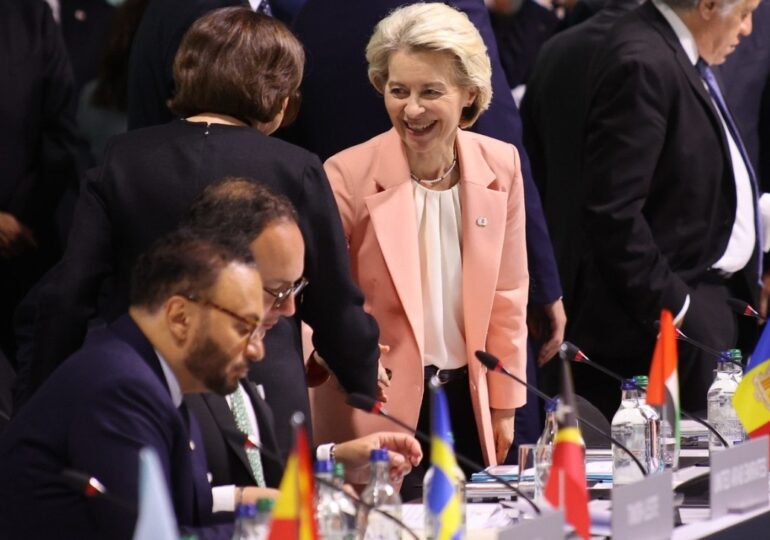Romania has obtained, through Roxana Mînzatu, the position of Executive Vice President of the European Commission, announced Ursula von der Leyen, the President of the European executive, on Tuesday.
This is the first time since joining the European Union that Romania has obtained this position.
Additionally, Romania has received the portfolio for Skills and Education, Jobs and Social Rights, Demography. Prime Minister Marcel Ciolacu stated that this is one of the most important portfolios.
Ciolacu argues that this is a major portfolio, which will manage one-fifth of the EU budget, specifically 235 billion euros.
„Ms. Roxana Mînzatu, Romania’s proposal for European Commissioner, will coordinate both the education part and the area of social policies, as well as the funding programs related to these areas, namely the European Social Fund Plus, the Social Fund for Climate, and Erasmus+. Today, Romanians’ efforts have also received well-deserved recognition through this portfolio that combines significant political weight and substantial EU funds, with solid legislative and political potential and essential access to Commission services and agencies,” said Marcel Ciolacu.
However, European law expert Alin Orgoan stated for Spotmedia that the portfolio obtained by Romania is weak in terms of influence. Nevertheless, it has greater visibility due to the position of vice president, the expert affirms.
Moreover, PNL MEP Siegfried Mureşan declared that the portfolio obtained by Prime Minister Ciolacu is devoid of content, has zero concrete competencies, and is contrary to what was promised, being a portfolio with a pompous title but lacking an economic component. It is not a victory, but a failure, Mureşan specifies.
The new EC team, consisting of 40% women
President of the European Commission Ursula von der Leyen announced on Tuesday in the European Parliament the composition of the future college of commissioners, which will include 11 women, representing 40%.
Von der Leyen, who aimed for gender parity in the future Commission, explained that the initial proposals from the member states had a percentage of 22% women.
„It was completely unacceptable,” she emphasized, acknowledging, however, that „there is still a lot of work to be done.”
The new European Commission team, according to Politico, includes:
– Ursula von der Leyen (Germany): President of the European Commission
– Teresa Ribera (Spain): Executive Vice President for the Clean, Fair, and Competitive Transition. Serves as the Commissioner for Competition.
– Henna Virkkunen (Finland): Executive Vice President for Technological Sovereignty, Security, and Democracy
– Stéphane Séjourné (France): Executive Vice President for Prosperity and Industrial Strategy
– Roxana Mînzatu (Romania): Executive Vice President for People, Skills, and Training
– Raffaele Fitto (Italy): Executive Vice President for Cohesion and Reforms
– Kaja Kallas (Estonia): High Representative for Foreign and Security Policy
– Magnus Brunner (Austria): Internal Affairs and Migration
– Hadja Lahbib (Belgium): Training, Crisis Management. Equality
– Ekaterina Zaharieva (Bulgaria): Startups, Research, and Innovation
– Dubravka Šuica (Croatia): Mediterranean. Responsible for relations with Mediterranean neighbors in the Middle East and North Africa
– Costas Kadis (Cyprus): Fisheries and Oceans
– Jozef Síkela (Czech Republic): International Partnerships. Covers expenses for international development and competes with China’s „Belt and Road Initiative”
– Dan Jørgensen (Denmark): Energy and Housing
– Apostolos Tzitzikostas (Greece): Transport and Sustainable Tourism
– Olivér Várhelyi (Hungary): Health and Animal Welfare
– Michael McGrath (Ireland): Democracy, Justice, and Rule of Law
– Valdis Dombrovskis (Latvia): Economy and Productivity, Implementation and Simplification
– Andrius Kubilius (Lithuania): Defense and Space
– Christophe Hansen (Luxembourg): Agriculture and Food
– Glenn Micallef (Malta): Intergenerational Equity, Youth, Culture, and Sports
– Wopke Hoekstra (Netherlands): Climate, Zero Emissions, and Clean Growth
– Piotr Serafin (Poland): Budget, Anti-fraud, Public Administration
– Maria Luís Albuquerque (Portugal): Financial Services
– Maroš Šefčovič (Slovakia): Trade and Economic Security, Interinstitutional Relations and Transparency
– Marta Kos (Slovenia): Expansion
– Jessika Roswall (Sweden): Environment, Resilience to Water and a Competitive Circular Economy.
Behind the scenes, negotiations for these positions were tough until the last minute.
On Monday, influential French Commissioner Thierry Breton abruptly resigned due to his poor relations with Von der Leyen. To replace him, Emmanuel Macron proposed a close collaborator, Stéphane Séjourné, the outgoing Minister of Foreign Affairs.
After this presentation of Ursula von der Leyen’s team, the commissioners are to be heard before the European Parliament and subjected to an approval vote, an institutional battle with the Parliament, which often seeks to mark its territory by rejecting certain candidates.
„It’s like taking an exam.” To prepare, the commissioner must review the ‘information book’, a ‘bible’ about what the previous commission did and what its objectives are,” says a person close to a resigning commissioner.
Several MEPs would like to reject the Hungarian candidate, accused of being an adherent of the nationalist positions of Prime Minister Viktor Orban.
Another sensitive issue is the possible allocation of a vice president post to Italy’s representative, Raffaele Fitto, Minister for European Affairs in the extreme right-wing government of Giorgiei Meloni. The left and center have announced their opposition to this.

